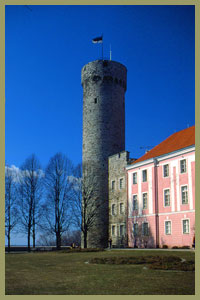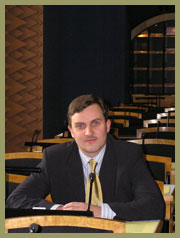|
As tall as Hermann
As a follow-up to a recent questionnaire and discussions on promoting the work of parliament, Heiki Sibul, the Secretary General of the Estonian parliament, provides his perspective on the challenges that parliaments face in better connecting with the public.
A medieval tower named Pikk Hermann (Tall Hermann) stands guard over the national parliament in Estonia's capital Tallinn.
The tower has withstood countless foreign invasions over the centuries and, most recently, became an important focal point for the people's movement that helped restore independence to Estonia in the early 1990s.
On 24 February 1989, the blue, black and white Estonian flag that had been banned under the Soviet administration was hoisted atop Tall Hermann as a prelude to a declaration of Estonian independence two and a half years later.
More than a decade after the restoration of independence and the re-establishment of the national parliament, Tall Hermann remains an important national symbol for Estonians.
"During a recent parliamentary open day, hundreds of people queued to climb the tower," notes Heiki Sibul, Secretary General of the Estonian parliament (Riigikogu).
While Estonians look with undiminished pride on Tall Hermann and the national flag that flies from it, the same cannot always be said for the national parliament that sits below it.
A recent survey showed that less than 60 per cent of people were pleased with
the way the parliament was operating. The voter turnout for the most recent
parliamentary elections held in 2003 was also below 60 per cent.
According to Heiki Sibul, there has been a turnaround in people's attitudes towards
the parliament over the past decade.

"When independence was restored, people looked upon the parliament with considerable pride as it started its work in building our nation," Mr Sibul says. "But when parliamentarians began exercising their democratic right to voice opposing views, people could not always understand why there was so much argument over an issue and why our parliamentarians could not come to an agreement and make a decision with a united voice."
Part of the problem was that decades of Soviet rule did not allow a democratic culture to develop, as all decisions were made without dissent.
"People's understanding of how democracy worked was limited, and they didn't always appreciate that debate and argument in the parliament were an important part of the democratic process," says Mr Sibul.
Splintered political representation in the parliament and a media intent on focusing upon the conflicts and arguments between politicians have also taken their toll on public perceptions of the Riigikogu.
"As a small, newly independent nation we don't have the abundance of personalities who the media normally focus on - sports stars, movie stars and the like," says Mr Sibul. "So our politicians get a lot of media attention and the coverage is not always positive. That impacts on the way the parliament is perceived."
The Estonian parliament has turned its attention towards this problem with various initiatives aimed at improving its public profile.
One such initiative was a recent roundtable with media representatives, parliamentarians, parliamentary administrators and academics. Its purpose was to look at ways in which the public could be better informed about the work of the parliament and, as a consequence, gain a better appreciation of how parliament was making a positive contribution to the nation.
The roundtable suggested a more proactive approach for the parliament in its dealings with the media.
Heiki Sibul responds by saying parliament has many components to it - including the speaker of the parliament, committees, factions, parliamentarians, their advisers, parliamentary officials and the media - and all need to fulfil their roles in informing the public of the parliament's work if people are to gain a better appreciation of that work.
He notes, for example, that previously media outlets assigned parliamentary reporters to cover parliamentary debates, but that is no longer the case. It is a gap that has meant less detailed reporting of issues raised in parliament and more focus on points of conflict. Mr Sibul says it is a problem that must be looked at in more detail in light of the roundtable's suggestions for a more proactive approach by the parliament in getting information to the media.
"Parliamentary officials need to have an active role in promoting the institution," he says, "but their responsibility is to provide balanced and politically neutral information, which is not what the media necessarily wants."
With six political parties currently represented in the Riigikogu, along with eight independent members, providing more interesting information to the media while remaining politically neutral is no easy task.
"The politics needs to stay with the politicians," stresses Mr Sibul.
Specific suggestions put forward during the roundtable include an increase in staffing of the parliament's media office to allow for more contact with the media, and improvements to the parliament's Internet site.
"The information on our home page needs to be organised in a more thematic way," says Mr Sibul, "so that people can find all the information on a particular subject in the one place without having to search through vast amounts of information that are not of direct relevance to the subject they are interested in.
"People should be able to access all the information on how parliament is dealing with a particular issue from the one spot, including any legislation introduced, any debates held, and any committee hearings conducted - even the forward program for consideration of the issue."
One initiative already operating successfully is the practice of conducting regular media briefings on parliamentary committee investigations.
Commenced on a trial basis at the beginning of the year, the briefings give the media insight into the various issues being investigated by committees and highlight some of the key developments in relation to those investigations. Conducted by the chairs of the committees, the briefings have now become a regular parliamentary fixture on Mondays.
"The media just didn't have the time to sit through the various committee hearings that were being held, and so the work of committees wasn't getting reported," explains Mr Sibul. "It's much easier getting the media to attend these short briefings that help to keep them informed about what's going on in committees.
"In fact we have recently had the situation where some press outlets have run weekend stories on the topics to be addressed at the following Monday's briefings as a way of getting a scoop on their colleagues."
As part of the efforts to better connect people with their parliament, Mr Sibul is keen to work more systematically with third sector organisations to better integrate them into parliamentary processes. His aspiration is to draw on their experience to help the parliament in its work and will look at ways in which this can best be achieved.
The task of making parliament more accessible to the public is one of the many challenges Heiki Sibul has faced in his ten years as Secretary General.
When Estonia regained its independence in the early 1990s, its whole legal system had to be revamped. Hundreds of laws and regulations had to be developed and a detailed set of procedural rules put in place for how the parliament would operate.
The previous period of Estonian independence more than five decades earlier provided a point of reference. But time had moved on and the rules for the new parliament, as well as the laws of the newly independent nation, had to reflect the needs of Estonian society at the start of the 21st century.
While Estonia looked to Scandinavian countries and western European nations such as Germany for inspiration, it was keen to have its own parliamentary and legal system to meet its own needs.
"It took us about five years to get the basic laws and procedures in place," Mr Sibul says. "Only then could we begin to refine some of our practices and build up the accountability mechanisms that are so important in a modern parliamentary democracy."
Since the early 1990s there have been 20 major procedural reforms in the Estonian parliament, culminating in the release of new Rules of procedure in 2003.
"Putting out the new rules helped us to draw a line under that period of early procedural development during the 1990s," Mr Sibul says. "It shows that we are now an effectively functioning European parliament."
A major task now is to consider the quality of the legislation before the Riigikogu and how effectively it is working.
Around 36 per cent of the legislation that is adopted by the Estonian parliament originates from among the membership of the parliament rather than from the government.
"That puts quite a bit of responsibility on parliament's secretariat to scrutinise the legislation being introduced," says Mr Sibul. "We do feel a certain amount of responsibility if we have helped in the preparation of laws that don't work properly or have problems associated with them."
The emphasis of the past decade was to get things in place quickly so that the parliament and the legislative system could begin operating. Now Mr Sibul wants to devote more time to the analysis of what has been put in place and how it can be improved.
He believes there are opportunities to benefit from the experience of other parliaments and would like to see the Association of Secretaries General of Parliaments discuss and debate issues of common interest in a more detailed way.
"In our early years, when we were setting up the parliament, we benefited considerably from discussing with our colleagues from other parliaments how they dealt with a particular issue. And we found the comparative studies of the ASGP most useful."
"I would like to see the ASGP place greater emphasis on the challenges and problems that parliaments are facing, and I would like us to consider how some of these major themes in our work can be discussed and debated more fully."
Mr Sibul believes it is not a case of doing more, but doing things more thoroughly.
"Take for example our questionnaires," he says. "There could be less questions but deeper questioning to get to the real nub of an issue."
One theme Mr Sibul is particularly interested in the ASGP pursuing is the way that parliaments conduct their external relations and how effective those processes are in helping parliamentarians understand and contribute to the issues of a globalised world.
And he believes there is more work that could be done in relation to the promotion of parliament, so that good ideas and interesting approaches developed in one parliament could be shared with and explored by other parliaments.
Looking back over the past decade, Mr Sibul is proud of the Estonian parliament's achievements.
"We have built a completely new legal system for a newly independent nation," he says, "even though some cynics and sceptics say the job is not yet finished."
He hopes that through greater public awareness of what the parliament is doing and how it is working, and through greater public involvement with its processes, the Riigikogu can in the future stand as tall as the Pikk Hermann tower that guards it.
Article prepared by Andres Lomp during his secondment as ASGP project officer at the Inter-Parliamentary Union in Geneva.

|